


Explore the differences between a fixed mindset and a growth mindset, and learn practical strategies to cultivate a growth mindset. Gain insights from Carol Dweck’s research and discover how to approach challenges with resilience and a willingness to learn.
Reading Time: 2 minutes
Fixed Mindset vs. Growth Mindset: What’s the difference?
To fully understand what a growth mindset is you first need to know what its opposite is. A person with a fixed mindset believes that their characteristics are unchangeable and this will continue to confirm their deterministic mindset of the world. Someone with a fixed mindset will be conflict-avoidant, give up easily when confronted with obstacles, see their personal effort as useless, ignore negative feedback even when it is useful to their growth, and feel personally threatened when others succeed. All of these traits are outlined in Carol Dwerk’s 2006 book Mindset: The New Psychology of Success.
The core of these mindsets is their response to failure. Someone with a fixed mindset sees failure as a reason to quit whereas someone with a growth mindset sees failure as an opportunity to grow further. Dwerk mentions in her book how people with a fixed mindset may read content that tells them to believe that failure is an opportunity but they cannot practice this belief because they view failure as something that defines you. She comments that someone who has a growth mindset may still find failure as “a painful experience” but that it does not define them and is instead “a problem to be faced, dealt with, and learned from.”
How to Conquer Your Fixed Mindset
Reframing your mindset around failure is the best way to start evolving into a growth mindset. A concrete, action step you can take the next time you face failure is to ask yourself “what can I learn from this?” When facing failure it can be hard to ask this question at first, that is why allowing yourself to feel disappointment is a key step, but those who have the power to take a step and put their failure into perspective will start to develop Carol Dwerk’s definition of a growth mindset.
In a 2015 TedTalk, Dwerk talks about the power of believing you can improve. More specifically harnessing “the power of yet”. Dwerk observed that when young people viewed problems that may be out of their reach to solve with a “not yet” mindset, it empowered them to continue working hard despite initial setbacks. Having a growth mindset allows you to view future goals that may feel unattainable in the “not yet” mindset. At InnerFlow, our cyclical Flow Journey allows our changemakers to harness the power of yet by constantly reassessing and changing their goals as they grow.

